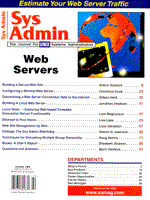
New Messages
Please send letters via email to saletter@mfi.com.
From: William Roy (wroy@camden.lmco.com) In the April 1996 article on auto-locking by Doug Morris, the SunOS_kbr [and] SunOS_msr scripts (from Listing 3) do not seem to work. The pstat at the end of each generates multiple values, none of which vary with keyboard or mouse input. I am running SunOS 4.1.4 with Open Windows.
Response from Doug Morris: The pstat technique will work on any streams device. I have used it on tty/pty devices to calculate the number of password attempts - more than three attempts resulted in .profile writing a message to a log and dissabling access to the id. SunOS supports a console switch through the ioctl function KIOCSDIRECT. If the switch value is 1, then the system keyboard is serviced by /dev/kbd; if it is 0, it serviced by the workstation console device (usually /dev/console). The Sun man pages (kbd, kb, console) on this are vague, but supposedly when a window system is activated the switch should be set to 1 (/dev/kbd). The only time I have seen the switch set to 0 is when the workstation is in console mode with no windowing system active. As soon as MIT X is started, the switch is set to 1. If the keyboard were not routed to /dev/kbd, the script and pstat would exhibit the symptoms you describe - most significantly, the file table offset value would not change for /dev/kbd. A program similar to the attached is the only way I know of identifying the routing of the keyboard. If the routing is not to /dev/kbd, then modify the scripts to use the workstation console device instead (usually /dev/console). Unfortunately, I cannot test this out because the workstations I have access are configured with maxuser values that break pstat (if the file table size exceeds 10000 pstat fails). The second technique described in the article will work on any X server, including workstations. I would recommend you use it instead. It does not have the OS/configuration dependencies that the pstat technique has. Good luck.
/* program to determine keyboard routing */ #include <fcntl.h>
#include <errno.h>
#include <sys/types.h>
#include <sys/stream.h>
#include <sys/stropts.h>
#include <sundev/kbio.h>
#include <sundev/kbd.h>
main(argc,argv)
int argc;
char *argv[];
{
int kbr=0, kb;
kb=open("/dev/kbd",O_RDWR);
if(kb < 0) perror("open fail");
ioctl(kb,KIOCGDIRECT,&kbr);
if (kbr == 0) {
printf("keyboard is assigned to workstation console\n");
}
else printf("keyboard is assigned to /dev/kbd\n");
}
Doug Morris
From: Bill Dyer I would like to point out an address change for Tcl/Tk. It's not longer at ftp.cs.berkeley.edu. It has been moved to:
ftp.smli.com and resides in /pub/tcl
Thanks for the information. -AA
From: Rich Holoch (holoch@ccnet.com) The following script is in response to the "Automated System Administrator's Pager" article in the May 1996 issue - it avoids the TAP/modem approach and simply sends Internet email to activate your pager. It works great, and was easy to write. pageme - An automatic UNIX paging utility
#!/usr/bin/perl
# pageme - sends E-Mail to recipients for a number of different
# system error conditions.
# Created 7/25/96 by R. Holoch - 90% disk utilization check.
#
sub runoscmd {
open(OS, "$oscmd|") || die "can't run $oscmd: $!";
@osret = <OS>; }
sub chkfs {
foreach $line (@osret) {
@fields = split(/\s+/,$line);
$fs = @fields[5];
if ($fs ne "/proc") {
$used = @fields[4];
# print "$fs $used\n";
chop $used;
if ($used > 90) {
$errcode = 911;
}
}
}
}
$oscmd = "df";
&runoscmd;
&chkfs;
if ($errcode) {
open (MAIL, "|mail rich_holoch\@iplink");
print MAIL $errcode;
close(MAIL);
}
|